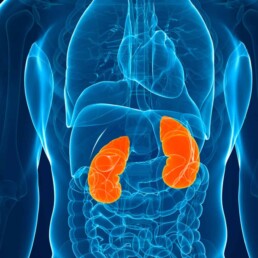The thyroid and kidneys are two vital organs in our body, and they play a crucial role in maintaining our overall health. Recent research has highlighted the link between thyroid and kidney diseases, showing that thyroid dysfunction can lead to kidney problems and vice versa. In this blog, we will discuss the thyroid-kidney connection.
By Majd Isreb, MD, FACP, FASN, IFMCP
The thyroid gland function
Before we discuss the thyroid-kidney connection, it is helpful to discuss the function of the thyroid gland briefly. The thyroid gland releases triiodothyronine (T3) and thyroxine (T4). These hormones play an important role in the regulation of your weight, energy levels, internal temperature, skin, hair, nail growth, and metabolism.
The pituitary gland produces a hormone called thyroid stimulating hormone (TSH) which propels the thyroid to produce T3 and T4. There is something called a feedback loop. So, when the levels of T3 and T4 increase, they prevent the release of TSH. When T3 and T4 levels drop, the feedback loop starts again. This system allows your body to maintain a constant level of thyroid hormones.
T4 is converted into T3, which is the active form of thyroid hormone. About one-third of T4, though, gets converted to something called reverse T3 (rT3). RT3 is not believed to be not an active hormone. Researchers believe the body produces rT3 in times of severe illness or starvation as a mechanism for preserving energy.
T4 and T3 circulate in the blood bound to a protein called thyroid binding globulin (TBG). The free forms of T3 and T4 are the active forms of thyroid hormone. Free T3 enters the target cells and the nucleus to regulate various genes.
Testing thyroid function
By this quick review, you can realize that thyroid hormones are complex and testing them should be more involved than the conventional medicine TSH screening. A comprehensive testing approach to the thyroid gland function should include assessing TSH, free T3, free T4, RT3, total T3, Total T3/RT3 ratio, FT3/FT4 ratio, thyroid Antibodies (anti-thyroid peroxidase antibodies, and anti-Antithyroglobulin antibodies).
The thyroid-kidney connection
The thyroid hormones play an important role in the growth and development of the kidneys. Thyroid function also influences water and electrolyte balance in different compartments of the body. But more importantly, the thyroid affects kidney function itself. On the other hand, the kidneys play an important role in the metabolism and elimination of thyroid hormones.
The effect of thyroid on kidney function
Studies have shown that thyroid deficiency (hypothyroidism) is associated with a decrease in glomerular filtration rate (GFR) and an increase in serum creatinine. Thyroid hormones were found to increase the blood flow to the kidneys, and a deficiency in thyroid hormones causes a decrease in the blood flow, which decreases GFR.
Thyroid excess (hyperthyroidism) is associated with the opposite effects in animal models.
Most of these changes are reversible with appropriate thyroid therapy. However, some researchers found that functional deficiency in thyroid hormones can also be associated with increased protein in the urine. This may indicate that hypothyroidism can lead to true intrinsic kidney disease and glomerulopathy.
The thyroid can also affect the kidneys indirectly by changing cardiac output and peripheral resistance. It also affects the production of insulin-like growth factor type 1 (IGF-1). Thyroid deficiency decreases IGF-1, which can increase insulin resistance and worsen kidney disease.
It is crucial to test for thyroid dysfunction in patients with kidney disease because correcting subclinical hypothyroidism has been found to preserve renal function and improve renal outcomes.
Thyroid disease and glomerulonephrites
Glomerulonephrites (GN) are autoimmune kidney diseases. Both thyroid deficiency and excess were found to be associated with GN. Thyroid dysfunction was found in membranous nephropathy, IgA nephropathy, membranoproliferative glomerulonephritis, and minimal change nephropathy.
This association is likely autoimmune in nature. Both thyroid diseases and glomerulonephrites are associated with circulating autoimmune elements called immunocomplexes. In fact, studies have shown that 26% of patients with thyroid disease have circulating immunocomplexes. This percentage increased to up to 55% in patients with autoimmune thyroid diseases such as Hashimoto’s thyroiditis. The presence of thyroid peroxidase antibodies correlates with the presence of these complexes.
Join us to end the kidney disease epidemic and receive the FREE Report “5 Pitfalls to Avoid When Caring for Kidney Patients”
The thyroid and tubular function
The tubules are responsible for the second stage in the process of elimination by the kidneys. Tubulointerstitial nephritis has been seen in patients with thyroid dysfunction. Thyroid excess has been especially seen in patients with tubulointerstitial nephritis and uveitis syndrome (TINU). Studies have shown that antibodies against modified C-reactive protein (mCRP) are possibly implicated in this syndrome and may also be the cause of the associated hyperthyroidism.
Tubulointerstitial nephritis and hyperthyroidism were reported together in patients being treated with rifampicin.
The thyroid and acute kidney injury
Besides the reversible changes in GFR mentioned above, thyroid deficiency has been linked to muscle breakdown (rhabdomyolysis), leading to kidney injury. This has been reported in patients who were treated with statins and patients who were not.
The thyroid effects on electrolytes
Thyroid hormones can cause affect the way the kidney handles water, sodium, potassium, and calcium. The following electrolyte abnormalities have been seen in patients with thyroid disorders:
- Hyponatremia (low serum sodium level) in hypothyroidism.
- Hypercalcemia (high serum calcium level) has been reported in hypothyroidism and hyperthyroidism.
- Hypokalemia (low serum potassium) and hyperkalemia (high serum potassium) were reported in hyperthyroidism.
The effect of kidney disease on the thyroid
The kidneys play an important role in the metabolism and clearance of thyroid hormones. CKD has been found to affect the hypothalamus-pituitary-thyroid axis. TSH can be elevated in CKD. CKD can also alter TSH circadian rhythm. Free and total T3 and T4 concentrations can be low in CKD.
More importantly, the peripheral conversion of T4 to T3 is impaired in CKD. The presence of metabolic acidosis (increased blood acidity), which is common in CKD, can make that worse. Total rT3 can be increased in CKD due to decreased clearance. rT3 can compete with T3 on the cellular level leading to worsening symptoms of thyroid deficiency in CKD.
Studies have shown that the rate of subclinical hypothyroidism increases as GFR decreases. Hypothyroidism is noted in about 18% of patients with eGFR of less than 60 ml/min/1.73 m2. Some researchers believe this is due to a decrease in the clearance of iodine, causing increased serum iodine levels and decreased thyroid hormone production.
Finally, nephrotic syndrome describes kidney diseases that are associated with massive loss of protein in the urine. This can lead to the loss of thyroid-binding globulin in the urine. It can lead to a decrease in serum total T4 and T3. However, free T4 and T3 remain normal, indicating that a normal thyroid can compensate in the case of nephrotic syndrome.
However, patients who have low thyroid reserve can develop overt hypothyroidism if they have nephrotic syndrome. Nephrotic syndrome also increases the need for higher doses of thyroid hormone therapy in patients with hypothyroidism.
The bottom line
There are significant interactions between the thyroid and the kidneys. Thyroid diseases can affect kidney function and are associated with different kidney diseases. Kidney diseases can also lead to various thyroid dysfunction. It is crucial to perform comprehensive testing of the thyroid in patients with kidney disease.







